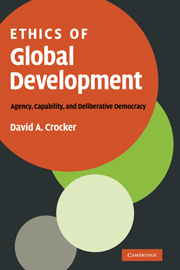Book contents
- Frontmatter
- Contents
- List of figures
- Acknowledgments
- 1 Introduction
- Part I Development ethics
- Part II The capability approach: ethical foundations
- Part III Strengthening and applying the capability approach
- 7 Agency, responsibility, and consumption
- 8 Hunger, capability, and agency-oriented development
- Part IV Deliberative democracy, participation, and globalization
- Index of names
- Index of subjects
8 - Hunger, capability, and agency-oriented development
Published online by Cambridge University Press: 22 September 2009
- Frontmatter
- Contents
- List of figures
- Acknowledgments
- 1 Introduction
- Part I Development ethics
- Part II The capability approach: ethical foundations
- Part III Strengthening and applying the capability approach
- 7 Agency, responsibility, and consumption
- 8 Hunger, capability, and agency-oriented development
- Part IV Deliberative democracy, participation, and globalization
- Index of names
- Index of subjects
Summary
In this chapter I focus on the scourge of hunger. Whether due to emergencies caused by natural calamities, such as tsunamis, drought, or locust infestation, or to chronic lack of food, world hunger shocks the moral conscience. “Hunger continues to be,” asserts the Hunger Task Force of the Millennium Development Project, “a global tragedy.” What are the facts about food and global hunger?
More than enough food exists worldwide for everyone to have enough to eat. Food aid scholars Christopher B. Barrett and Daniel G. Maxwell state the relatively undisputed facts at the outset of their important volume Food Aid After Fifty Years: Recasting Its Role: “Enough food is produced globally to meet every person's dietary requirements adequately. In 2000, the world enjoyed a daily per capita supply of more than 2,800 kilocalories and 75 grams of protein, more than enough to keep every man, woman, and child well nourished.”
Food availability, however, does not result in nutritional well-being for all. Although estimates depend on definitions of hunger and nutritional adequacy, the Food and Agriculture Organization (FAO) of the United Nations estimated in 2004 that in 2000–2 approximately 852 million, or one sixth of the world's people, did not have enough to eat. Although most of the world's hungry people live in Asia (Bangladesh, China, India, and Indonesia), fully 30 of the world's 190 or so countries – two-thirds in sub-Saharan Africa – have insufficient food to provide their inhabitants with 2,100 calories per person per day.
- Type
- Chapter
- Information
- Ethics of Global DevelopmentAgency, Capability, and Deliberative Democracy, pp. 255 - 294Publisher: Cambridge University PressPrint publication year: 2008
- 1
- Cited by



